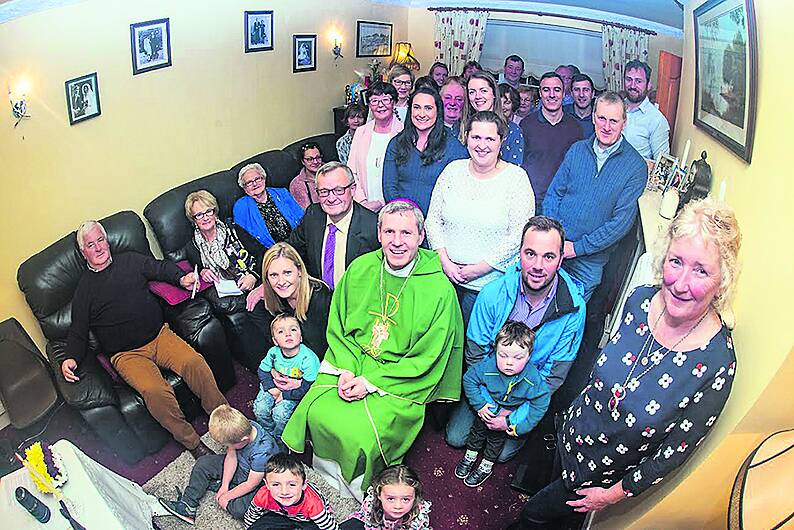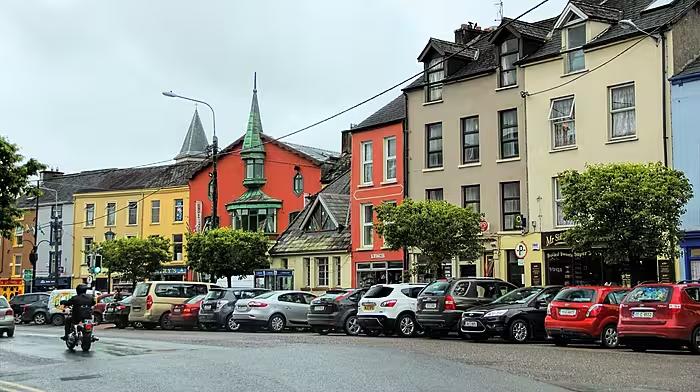The news that the newly-appointed Bishop of Cork & Ross paid a visit to his first ever ‘station mass' recently had a lot of West Cork residents asking: ‘So, what IS a station?'
The news that the newly-appointed Bishop of Cork & Ross paid a visit to his first ever ‘station mass’ recently had a lot of West Cork residents asking: ‘So, what IS a station?’ Emma Connolly on the religious tradition that’s still very much alive
‘THEIR toilet is very low to the ground,’ an elderly woman hissed to the neighbour sitting at the table beside her.
‘What’s that?’ the woman asked.
‘I’m just warning you that their toilet is quite low, so watch your back when you go later on,’ she replied.
Her curiosity piqued, the second woman trotted off to see for herself, only to discover that said ‘low toilet’ was in fact a bidet, which was the height of sophistication back in the 1980s. The two items were easily confused if you weren’t in the know.
That particular exchange was heard at a local stations some time back and I’m not sure if the lady of the house ever discovered what happened, probably several times that night. Probably best if she didn’t. And if you grew up in West Cork you’ll have your own mirth-filled memories of a tradition that’s almost unique to these parts.
If you’re not from here, The (the capital ‘T’ was very important then!) Stations are best summarised as the local priest hearing confessions and saying mass in your house, everyone giving him money for it and then you putting on a huge (we’re talking massive) spread for all your neighbours. There is of course a drink (or two) to be enjoyed and a sing-song and it isn’t regarded as a successful stations if people leave on the same day they arrive. Then – a bit like a relay – you have to pass the baton on to someone else to do it all over again.
Every parish is divided into a station area and the big question around the kitchen table when I was growing up was: ‘Who is having The Stations next?’
If you skipped your turn (it usually came around every few years) it was duly noted and not approved of, and where you came on the list was also an important factor.
For example, there might be some household you’d like to go before, in case they set the bar too high. And then some you’d want to go after, to see what they did and then up your game accordingly.
And then, the time of year was also a factor.
A dark evening would mean the outhouses and garden wouldn’t be up for inspection. (Brexit negotiations have nothing on this.)
The tradition dates right back to Penal times when priests were forbidden by law from saying mass in public, so to get around it they did it secretly in people’s homes. Those gathered would then stay on for breakfast.
As time went by, the laws were eventually repealed, but by then The Stations had become a ‘thing.’
It evolved into an evening event – there was still a mass and for lots of people that was, and still is, a very important and special thing to happen in the home. In the 70s and 80s, some hosts were so honoured to have the priest celebrate mass in their homes that they’d drink the water he had used to wash his hands. The Health & Safety police might have something to say about that these days!
Station dues were also collected, and still are, and formed an important part of the priest’s annual income.
But, outside of evangelical benefits to the household, the social aspect was also hugely important. A West Cork priest recently admitted (at a Stations!) that decades ago it was an occasion that young men and women used to ‘carouse in haysheds’ and for that reason alone, they were banned in one part of Tipperary!
Women of a certain age also insist it was the only time ‘The Men’ would do anything for them and, without it, their homes would probably have fallen down.
But, of course, it was also a chance to show off a little, or a lot, as basically you were giving your neighbours a legitimate reason to have a good snoop around your home. There was no area off limits. With confessions taking place in the bedrooms, it was very easy to take a wrong turn down a corridor. Indeed.
In advance, the buckets of whitewash would be flying, there’d be new settees ordered and wallpaper lashed up with lots of people keen to show they’d made improvements since the last Stations. And if there was a new ‘woman of the house’ interest cranked up a notch again. ‘Did you see what she did with the place?’ kind of thing.
What was on the menu varied from a hot dinner to sandwiches and every kind of bun and cake imaginable, but more typically it was, and still is, a cold plate.
You have to remember that when Stations were in their prime, it was a time when the ICA had a large membership and the Calor Housewife of the Year was a big deal, so you were judged quite critically on the quality of your cold plate and fruitcake.
Turkey and ham were obviously a must, potato salad, a boiled egg, tomato and lettuce. Someone told me they introduced coleslaw to the plate in the early 80s and it was met with absolute suspicion and fear that it would ‘give them all scour.’
The men’s plates were usually given more meat and they were all seated together in ‘the good room’ and the priest would be seated at the top of the table.
The women would be put at another table, most likely in the kitchen.
All the ‘good’ ware, cutlery and crystal, was pulled out for the night. In fact if it wasn’t for the The Stations they might never have been used at all.
The biggest fear was that there wouldn’t be enough to eat and drink. I don’t believe that ever happened.
Lots of tea would be drunk before any alcohol appeared and generally the cue for that to happen was given by the priest. Although in some cases it had to be after he departed.
And then the singing would start and was taken so seriously in some houses that there was a list of who was going next and performing what.
As a child, and even as a teen, I remember The Stations as a really big deal. It just seemed absolutely gas that the priest you’d see every Sunday on the altar was there in your living room saying mass at a table with your mother’s white cloth over it. You daren’t make eye contact with a sibling for fear of starting a fit of skitting you knew you wouldn’t be able to control.
Confession in a bedroom (possibly your own!), with a wardrobe door separating you from the priest, was also something that seemed on the one hand absolutely bizarre, yet totally normal.
These days, with both men and women working outside the home, and neighbours not being so connected, the tradition is slipping in places, but going strong in others. In certain places there are no longer home-based stations, and the mass is held in the church.
Fr Tom Hayes, PP in Enniskeane, where the Bishop of Cork & Ross recently attended a station, surprising the locals, said lots of people still have a very strong attachment to the tradition.
The main challenge, he said, was ensuring the diocese had sufficient priests to attend them.
The death of Gay Byrne last week, I think, made us all feel a little nostalgic, rightly or wrongly, for years gone by.
So, while the stations from one perspective might seem slightly bizarre or quaint, many of us tend to see them through rose-tinted glasses.
Besides, I need a bit of a push to sort out my living room … does anyone know who is having The Stations next?







